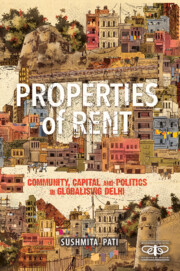Book contents
- Frontmatter
- Contents
- List of Maps and Figures
- Acknowledgements
- List of Permissions
- List of Abbreviations
- Units of Measurement
- Maps
- Introduction
- 1 Creating Values of Land: Law, Records and Kabza
- 2 From Buying Land, Owning Taxis to Becoming Landlords: The Changing Economic Landscape of Villages
- 3 Villages of the City: Ordering Spaces and Aspirations in Neoliberal Times
- 4 In the Shadows of the State: Community as a Mode of Political and Economic Organisation
- 5 Culture, Gender and Belongingness? City and the Violence of Rent
- 6 The Fringes of the Cartel: How the Marginalised Become Landlords
- 7 The Allure of Politics: The Candidates, the Cadre and the Euphoria of Elections
- Epilogue
- Glossary
- Bibliography
- Index
2 - From Buying Land, Owning Taxis to Becoming Landlords: The Changing Economic Landscape of Villages
Published online by Cambridge University Press: 31 March 2022
- Frontmatter
- Contents
- List of Maps and Figures
- Acknowledgements
- List of Permissions
- List of Abbreviations
- Units of Measurement
- Maps
- Introduction
- 1 Creating Values of Land: Law, Records and Kabza
- 2 From Buying Land, Owning Taxis to Becoming Landlords: The Changing Economic Landscape of Villages
- 3 Villages of the City: Ordering Spaces and Aspirations in Neoliberal Times
- 4 In the Shadows of the State: Community as a Mode of Political and Economic Organisation
- 5 Culture, Gender and Belongingness? City and the Violence of Rent
- 6 The Fringes of the Cartel: How the Marginalised Become Landlords
- 7 The Allure of Politics: The Candidates, the Cadre and the Euphoria of Elections
- Epilogue
- Glossary
- Bibliography
- Index
Summary
Political theory is not, or anyway ought not to be, intensely generalised reflection on intensely generalised matters, an imagining of architectures in which no one could live, but should be, rather, an intellectual engagement, mobile, exact, and realistic, with present problems presently clamorous….
—Clifford Geertz, Available Light: Anthropological Reflections on Philosophical TopicsThe villagers were not just mute spectators as the city grew around them. Divested of their farmlands, but armed with compensation money, they were now forced to figure out ways in which the money could give them most returns. Stories of the older generation being cavalier with compensation money abound. Some arguably spent their money on alcohol and new possessions. Some were cheated out of their money. Some others made bad financial decisions. But many were clearly trying to make decisions based on available information to make the most of their situation with varying degrees of success. But irrespective of what the villagers did, their fates were intertwined with the fate of the city. This chapter traces what the early period of this transition —from 1960s to 1980s—looked like for these villagers and how they proceeded to create a stake for themselves in the emerging urban economy.
Making use of life histories or rather ‘stories they tell themselves about themselves’ to narrate an account that spanned generations, of failed endeavours and successful businesses, of pure grit and stray luck, I attempt to tell a story of villages against the backdrop of the urbanising city. Together, the story paints a picture of urban villages, which open up to new businesses, new money and, most crucially, real estate—most of which continue to function in the domain of informality and forge different relationships with the national and global political economy. However, I try to show in this chapter that a process that appears incidental and isolated is deeply linked to a changing political economic landscape of the country.
This story sounds very different from the story of deprivation and dispossession that several other studies have shown. The Jats are able to turn land acquisition into an opportunity, as land acquisition creates an active urban property market.
- Type
- Chapter
- Information
- Properties of RentCommunity, Capital and Politics in Globalising Delhi, pp. 59 - 85Publisher: Cambridge University PressPrint publication year: 2022

